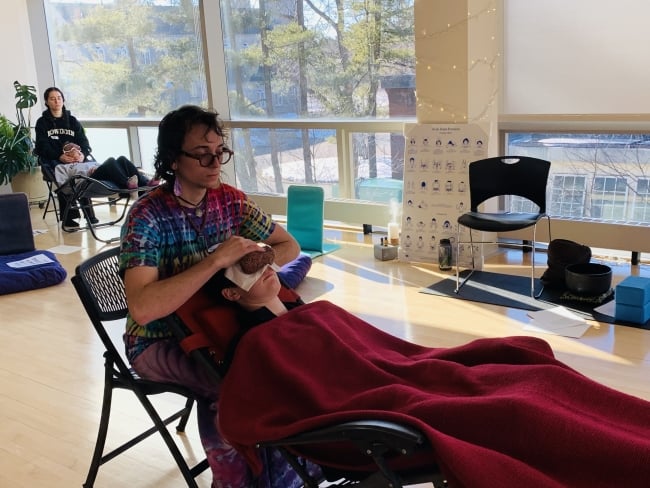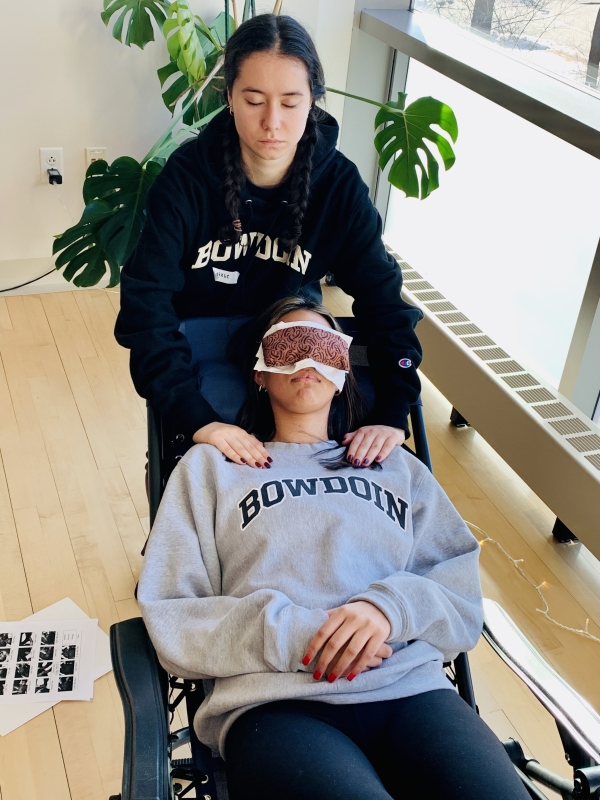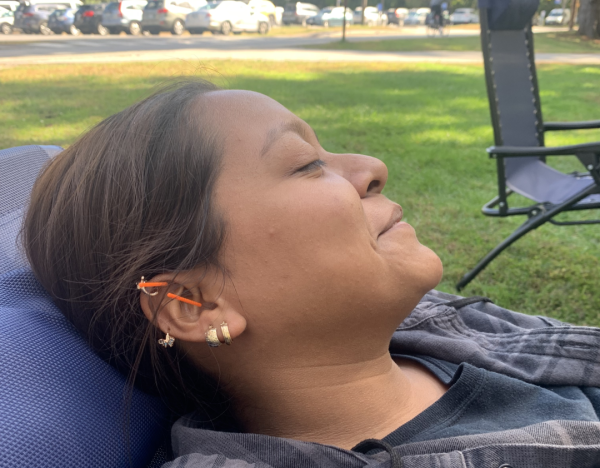You have /5 articles left.
Sign up for a free account or log in.

Bowdoin College students can participate in a weekly Reiki clinic to destress from their academics.
Bowdoin College
Students find themselves on pins and needles every week at a regular acupuncture clinic offered by Bowdoin College’s student wellness office.
The practice allows stressed-out students at the Maine institution to relax, focus on healing and promote overall well-being.
“It’s easy for students to feel relatively disembodied; they’re in their heads all the time,” says Kate Nicholson, director of student wellness. “Here they’re acknowledging that their bodies are here, too, their hearts are here, too, their spirits … are here, too. It’s a place where their whole self is invited in.”
Bowdoin has offered acupuncture for years, and following remote instruction due to COVID-19, Nicholson wanted to amplify and expand the clinic’s offerings, adding the Japanese energy-healing technique Reiki to the college’s offerings.
What’s the need: Nationally, students report high levels of stress impacting their academic life. An April 2023 Student Voice survey from Inside Higher Ed and College Pulse found three in four students say stress negatively impacts their ability to focus, learn and do well in school.
Acupuncture and Reiki can be high-impact practices and stress relievers, as well as help students reconnect with their physical bodies in low-effort ways.
“Most campuses generate a culture that generates learning and doing and output, which can be wonderful things. But they’re not environments or cultures that are conducive to rest and relaxation,” Nicholson says.
Integrative health services like acupuncture can be cost-prohibitive to students, but having them subsidized or free increases access, as does an on-campus location.
Many students are unfamiliar with Reiki or acupuncture prior to their first appointment, providing an opportunity for them to learn and experience a different type of wellness.
How it works: Every Wednesday, a local acupuncturist uses one of Bowdoin’s multipurpose rooms for two hours to provide 25-minute acupuncture sessions to students on a first-come, first-serve basis.
Later that day, in the same room with dim lights, a diffuser and gentle music, four volunteer Reiki practitioners each engage individuals in Reiki healing, also for around 20 minutes at a time.
Students sign up for one of 16 available weekly Reiki sessions using the CampusGroup app. Slots are always full, Nicholson says.

Bowdoin College
More recently, Bowdoin has offered level-one training in Reiki for interested students, which allows them to practice Reiki on themselves, their friends or family members.
Reiki training also fosters a culture of wellness that is compatible with the busy student life, Nicholson says.
The impact: Student engagement with the clinics has been overwhelmingly positive, Nicholson says. Student survey feedback demonstrates appreciation for the opportunity to prioritize their well-being during the day and for the relaxing and peaceful environment the two services create.
In an anonymous exit survey, one student shared with Nicholson, “I come to Reiki for my spiritual renewal and rejuvenation.”
As a result of Reiki trainings on campus, 20 students are level-one practitioners.

Bowdoin College.
Looking ahead: In the future, Nicholson hopes to grow the program further to reach more students.
Students, overworked and under rested, are also sometimes overcommitted, which makes attendance at Reiki events hit-or-miss, Nicholson says. She has started to email day-of reminders to students signed up for Reiki to give others on the wait list a chance to attend if one of their peers doesn’t, which has improved overall engagement.
Another challenge is reaching students who have classes at the same time integrative healing services are offered, so Nicholson is brainstorming ways to expand hours or add another day of service offerings.
Do you have a wellness tip that might help others encourage student success? Tell us about it.




